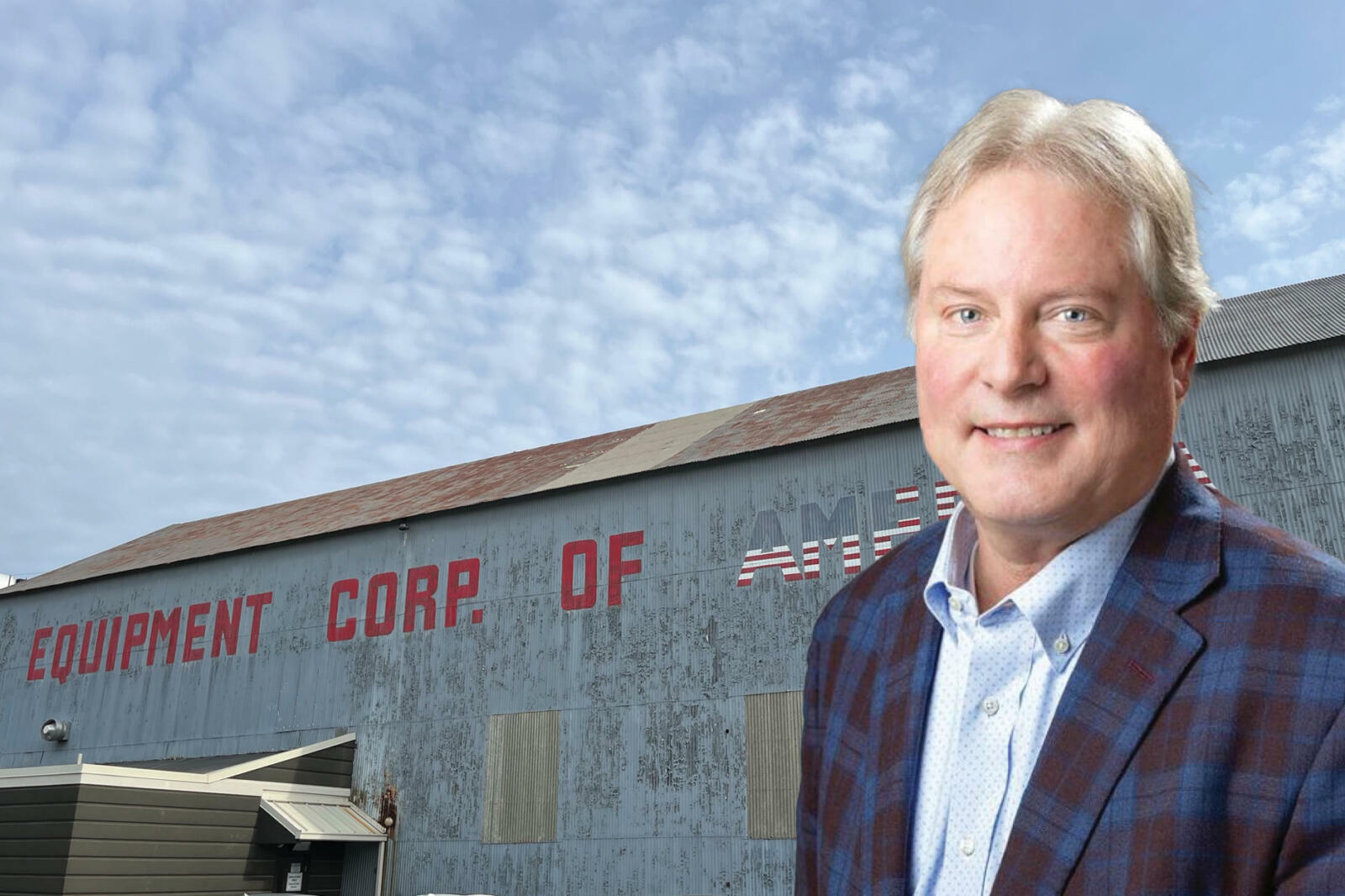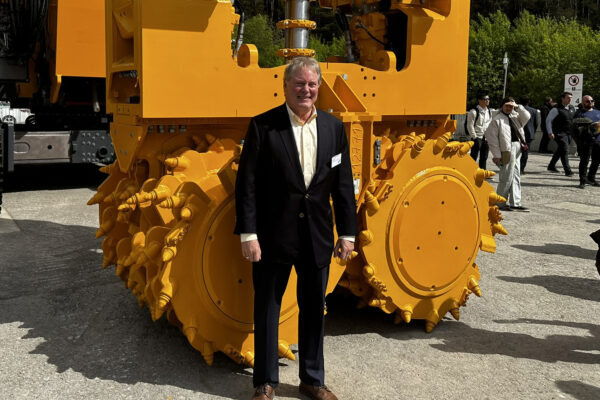A Foundation for Success: How family-owned ECA cemented its place in the construction world
Jun 10, 2024

By Anthony Castrovince
*This article was originally published in Smart Business Pittsburgh Magazine
Even if you have never heard of Equipment Corporation of America, you have seen the fruits of its labor.
The Coraopolis-based supplier of foundation construction equipment was part of the projects that built the World Trade Center, the Vietnam Veterans Memorial, the Thomas Jefferson Memorial, the Hoover Dam, the Big Dig, the Toronto and Washington, DC, subway systems,countless condos, and office buildings and just about every sports stadium east of the Mississippi. ECA's foundational footprint, in other words, is massive.
“We've developed expertise over the years, and we work hard at it,” says ECA president and. CEO Roy Kern. “One thing we believe in strongly is strategic planning.”

Having been in business for more than a century, ECA's planning clearly pays off. The company is the exclusive distributor for several of the leading rigs in the industry and offers sales, rentals, service, parts, and training from its 11 facilities throughout the eastern United States and all Canadian provinces.
With an entrepreneurial spirit and adaptability, ECA has remained nimble enough to achieve significant growth amid various economic downturns and evolving trends. The company's revenue has risen from around $7.5 million when Kern took over the family-owned business in 2000 to $120 million in 2023. In that same timeframe, the employee count has gone from around 30 to over 150. Kern credits an emphasis on productive and innovative equipment and a commitment to customer satisfaction in making that growth possible.
“We sell quality and productivity,” he says. “In the long run, that is what drives value and profitability for our customers.” And ECA knows plenty about surviving for the long run.
FAMILY CORNERSTONE
The story of ECA's important place in the advancement of the construction industry begins not with a drilling rig but a typewriter.
Roy Kern's grandfather, Len, was a high school dropout looking for a long-term career when he decided to take up typing and attend secretarial school. Around 1920, he found a job as a secretary in ECA's new Pittsburgh office after the Chicago-based business expanded its portfolio of construction, industrial and material handling equipment. But Len was not a secretary for long.
“He rose in the ranks very quickly and was branch manager within eight years,” Roy Kern says. “There were 54 shareholders at the time, and he bought people out as he got bonuses and whatnot.”
By 1959, Len Kern had bought out all the shareholders and become president of what was now — and has remained ever since — a family-owned business.
Len only served in that role for a few years before succumbing to lung cancer, leaving his son — Roy's father, Al — in charge.
“My dad had left the Navy, where he was a civil engineer and an officer, and came back home to work for his dad,” Roy Kern says. “Dad ran the business from 1965 to 2000.”
Under Al Kern, ECA shifted its emphasis from repairing, refurbishing and renting usedequipment to build relationships with manufacturers and distributing new equipment. ECAbegan to expand to new locations and build a reputation for its customer service.
Roy Kern, who earned his bachelor's in mechanical engineering at Penn State and his MBA at Cornell, initially worked outside the family business as a financial analyst in Chicago before joining ECA in 1986 to sell equipment. His educational background and outgoing personality served him well as he elevated within ECA to eventually succeed his dad as president and CEO.
“What I realized, as I was working for my dad, was that we really needed to grow as a company,” Kern says. “We had our territory in the mid-Atlantic and the Northeast, but we didn’t have that much buying power with our manufacturers, and we were kind of landlocked with where we were at. We needed to expand geographically and with our products.”
And so ECA expanded its focus to include the drilling aspects of the foundation industry, putting itself ahead of the curve — and its competition — in what would become popular methods of installing foundations. ECA rode that wave to massive growth and has never looked back.
“Our growth plan,” says Kern, “has been oriented around where we need to locate so that we can take care of major customer hubs and be within a day's drive of taking care of a customer. It’s all about the service.”
And to provide the best possible service, ECA stays current with the market's most sophisticated foundational equipment.
DRILLING FOR IDEAS
Roy Kern tells a story that demonstrates the benefit of ECA's strategic planning.
In 2019, the company's analysis of market conditions i
dentified soil mixing equipment — a preferred technology for environmental applications — as worthy of investment. The machinery mixes the soil with concrete to stabilize, solidify and treat a variety of wastes.
“We thought that was going to be a pretty good market moving forward, because it's useful environmentally and foundationally,” Kern says. “So, we invested pretty heavily in the pumps and the mixers and the drill rigs and the tooling to perform soil mixing.”
Then came COVID, which shut down many industries … but not the kind of construction projects ECA is involved in.
“All of a sudden,” Kern says, “all these soil mixing jobs started popping up. We probably sold $30 million worth of equipment, because we had it on the shelf, and we had engineers on staff to help a customer design a project.”
In 2020, when so many companies were struggling, ECA's business was up 20 percent because of that foresight.
Kern says ECA success stories such as that one are ultimately attributable to af lat organizational structure that allows employees to excel.
“I’m very much a consensus kind of leader,” he says. “I like to get buy-in with decisions, and I like to hear other opinions. I may decide to do it my way eventually, but I really do listen to others options and get buy-in from everyone. You can’t do it all yourself.”
And Kern knows he can't do it forever, either. That's why he's made plans that will carry ECA into another generation of family operation.
FAMILY PLANNING
Kern's appreciation for strategic planning does not just apply to the way ECA operates day to day but also to the company's long-term future. He recently spent a year working with a succession planner to properly strategize with ECA's top executives, and his attorneys and investment and banking people, about how to properly position ECA for his eventual retirement.

“I've got a lot tied up in ECA, and I need to pass it on to the next generation,” Kern says. “I’ve got two kids. I need to take care of them and my wife and my retirement. And then, from the company side, we worked on succession planning for individuals who are retiring around me age, and we also looked at compensation plans and what we could do to retain our top talent.”
Given the company's history, it should come as no surprise that the plan is to keep ECA in the Kern family. Roy's son, Rod, joined ECA as an applications engineering manager in 2020 after getting his master's in business administration and geotechnical engineering from Cornell, and working as a staff engineer and assistant project manager for a geotechnical contractor in the New York and New Jersey area. The younger Kern, who was recently appointed as ECA's vice president, is being groomed to eventually succeed his father as president.
“He was running around the five boroughs as a project engineer and using a lot of our equipment as he was doing it,” Roy Kern says. “It really gives him a lot of credibility. He's got a great education, and he's personable and articulate and very bright, so our succession plan is for him to take over in three to five years, and I'll back off and spend a while as CEO and then took of. We have a good core of young leaders that are going to take this company to greater levels than I ever thought about.”
And though ECA has offices as far away as Vancouver and Calgary in Canada, it will remain rooted in Pittsburgh.
“There are a lot of geotechnical contractors based in Pittsburgh, so it's not a bad place to be,”Kern says. “We’ve got good access to our markets.”
ECA has a long-term relationship with Pittsburgh and with many of its employees. The company has a strong retention rate, and that allows it to maintain a strong level of industry knowledge and the ability to stay abreast of changing trends.
“We're very good at bringing new products, new technologies into the market,” Kern says. “We'll continue to try to work on our margins and customer service and our facilities, and keep updated so that we can provide the best service we can to our customers. I think we have a real bright future.”
